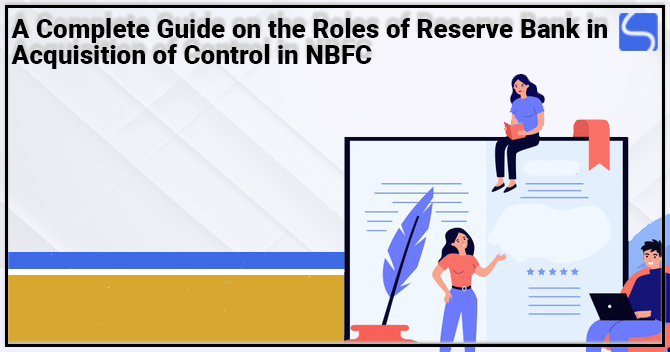Buying and Selling of NBFCs in India – An Overview

Karan Singh | Updated: Jun 05, 2021 | Category: NBFC
In terms of finances, the buying of NBFC is often called business entity takeover, whether by approval, wherein the seller entity is ready to sell its assets to the company acquiring/intentionally and secretly obtains the control over the business. When all the assets and liabilities are transferred to the acquirer, then the seller’s balance sheet of the Seller Company or entity represents the null outcome. There are some business organisations who often experience a devastating defeat or outstanding success after such hold & molds because the idea of buying and selling of NBFCs is not new in terms of the economic world. Like traditional banks, buying and selling of NBFCs take place, and in a similar process, there might be an opportunity for uncertainty and bias.
So the Reserve Bank of India (RBI) laid down the process for the buying and selling of NBFCs. Buying of Non-Banking Financial Companies (NBFCs) is a much simpler and fast-growing business method instead to set up an NBFC, and it takes only 45 to 60 days to implement the deal of this process.
Table of Contents
What is the Procedure for Buying and Selling of NBFCs in India?
The process of buying and selling of NBFCs in India begins with the consent of the Reserve Bank of India[1] under the conditions, whose violation could lead to no outcomes:
- Any selling & buying of NBFCs in India may not ensure the full alteration of the management;
- Any modification in the shareholding that leads to 26% buying or selling of the paid-up equity capital of Non-Banking Financial Companies increases over time;
- Any major alterations in the management of more than 30% of the NBFC’s directors.
Conditions that Support Non-Approval of Reserve Bank of India
There are some events in which consent from the Reserve Bank of India is not essentially compulsory. Those are as follows:
- The changing 26% share capital of the company comes out to be the result of a depletion in the capital or buyback of shares under the court authorisation;
- Some major changes in the management (30% to be exact) due to rotation of the changes or directors in the independent directors.
Documentation – Buying and Selling of NBFCs
It is vital when it’s come to business deals, and Non-Banking Financial Companies are no exception here. The inclusion of assured documents is compulsory concerning the buying and selling of NBFCs in India. Documents are the only method that justifies the deal purpose. Later, the application is forwarded to the Reserve bank of India on the letterhead of the entity or company for the consented purpose accompanied by the following vital documents.
- Details of the designated Directors;
- A statement of non-association concerning the COR (Certificate of Registration) and the role of Directors;
- A statement representing the director’s track record;
- Legal documents that provide detail concerning the source of funds;
- Banking concerning documents of all designated directors.
Once such formalities and documentation are addressed, the application should be sent to the Regional Office of the DNB (Department of Non-Banking), under whose jurisdiction the NBFC Registration Office is located.
The RBI may ask the candidate to simplify some doubts in the background of the submitted application. The candidate requires being proactive in this factor and should reply to such questions as rapidly as possible to avoid any delay that may hinder the processing of the application. The consent period of such an application demands around 2 to 3 months of time-span. But, that depends on the case nature.
Prior Notice in Case of Alternation in Management
The public notice shall specify the following details:
- The company’s intention to sell its ownership or control;
- The reason assured by the company that signifies the complete transfers of liabilities & assets;
- The balance sheet detail of the target Non-Banking Financial Companies, which is planned to get sold out.
Groundwork of Share Purchase Agreement
The Share Purchase Agreement is a lawful document that is arranged and consented to by the concerning party that is buyer and seller concerning the company management of the seller, which is providing its control to the buyer. And in the event, if any, deliberation is remaining, shall be addressed within thirty-one days of the public notice or as jointly agreed by concerning parties.
Handover of the Complete Assets of Selling Company to the Acquirer
In the buying and selling of NBFCs, this is the end destination of this boring process where both parties concurred with the purchase agreement & sign it to close the deal. This sign performs as a final stamp on the agreement where the assets of the Transferor Company will be discharged, and the liabilities will be paid off. The buyer will receive a bank balance in the name of the company, whose evaluation is based on net-worth as on the acquisition date.
Conclusion
The convenience, transparency, performance, and versatility are the few factors that make Non-Banking Financial Companies a standout choice among organised banking. The way Non-Banking Financial Companies deal with the financial issues of the concerning parties is more persuasive than their counterparts, which in turn helped them to grow excellent reputation overtimes.
There is no denying the Non-Banking Financial Companies are the only contenders in the economic sector, which represent the real potential of lending money by avoiding the traditional barriers. It has delivered a much-needed severity to the nation’s financial system by delivering hassle-free lending services to aid seeker at relaxed standards.
Since such institutions have not got the freedom of obtaining public deposits that are repayable on demand, many ultimately choose to sell out. The severe Reserve Bank of India regulations is putting a lot of stress on these institutions, which is the only reason for their untoward backout.















